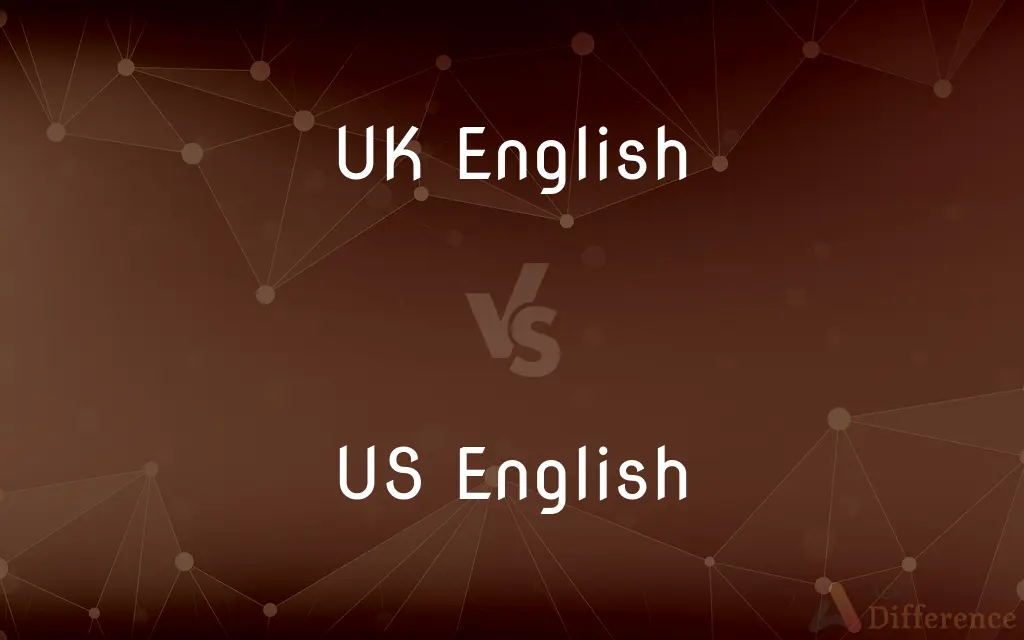UK English vs. US English — What's the Difference?
Edited by Tayyaba Rehman — By Fiza Rafique — Published on November 12, 2023
UK English originates from England and has its unique spellings, vocabulary, and grammar. US English, derived from British settlers but evolved distinctly, varies in spelling, terminology, and sometimes grammar.

Difference Between UK English and US English
Table of Contents
ADVERTISEMENT
Key Differences
UK English is rooted in the history and evolution of the English language in the United Kingdom, particularly England. US English, on the other hand, started with British colonial English but diverged over time due to various influences.
UK English often retains traditional spellings, whereas US English has undergone spelling simplifications. For example, in UK English, it's "colour," while in US English, it's "color."
Various everyday terms differ. In UK English, one might use "lorry" for a large vehicle, while in US English, the term is "truck."
Pronunciations can vary significantly. For instance, the word "schedule" in UK English might sound like "shed-yool," while in US English, it's more like "sked-yool."
Some grammatical structures and conventions differ. In UK English, collective nouns often take a plural verb form ("The team are playing well"), while in US English, a singular verb form is typical ("The team is playing well").
ADVERTISEMENT
Comparison Chart
Spelling
Colour, flavour, honour.
Color, flavor, honor.
Vocabulary
Lorry, flat, biscuit.
Truck, apartment, cookie.
Punctuation
Full stops outside quotation marks.
Periods inside quotation marks.
Past Simple/Present Perfect
"I've just had lunch."
"I just had lunch."
Collective Nouns
"The team are winning."
"The team is winning."
Compare with Definitions
UK English
The standard for professional and academic writing in the UK.
She edited the research paper to conform to UK English standards.
US English
The form of the English language spoken and written in the United States.
He writes his scripts in US English.
UK English
Represents the linguistic traditions and influences of the British Isles.
The influence of UK English can be seen in former British colonies.
US English
English that reflects the linguistic development and influences in America.
US English includes terms influenced by various immigrant groups.
UK English
A variant of English characterized by certain spellings, terms, and pronunciations.
In UK English, aeroplane is commonly used instead of airplane.
US English
The standard for professional and academic writing in the USA.
The journal requires articles to be written in US English.
UK English
English with grammatical and lexical features predominantly used in Britain.
In UK English, it's quite common to hear Have you got a pen?
US English
Represents the diverse linguistic and cultural influences of the United States.
The regional dialects in US English are fascinating to study.
UK English
The form of the English language spoken and written in the United Kingdom.
She prefers reading novels written in UK English.
US English
A variant of English with spelling, vocabulary, and pronunciation distinct to America.
In US English, the back of a car is the trunk instead of the boot.
Common Curiosities
What is UK English?
UK English is the variant of the English language used predominantly in the United Kingdom.
Are UK English and US English considered separate languages?
No, they're dialects of the same language, but with noticeable differences in various aspects.
Which is older, UK English or US English?
UK English is older, with US English evolving from it due to American colonial history and other influences.
Can Americans understand UK English easily?
Generally, yes, though certain slang or regional terms might be unfamiliar.
Why are there vocabulary differences between UK English and US English?
Vocabulary differences arose from distinct historical, cultural, and linguistic influences in each region.
Why do UK English and US English have spelling differences?
Spelling differences arose from linguistic evolution, education standards, and influential figures like Noah Webster in the US.
How is US English different from other English variants?
US English has distinct spelling, vocabulary, and sometimes grammatical differences shaped by America's history and influences.
How have media and globalization affected UK and US English?
Global communication and media have led to increased mutual awareness and borrowing of terms between UK and US English.
Is one form of English better or more correct than the other?
No, both forms are valid. It's a matter of regional usage and preference.
Has the internet blurred the lines between UK English and US English?
Yes, global communication has led to increased intermingling of the two dialects.
How did US English develop its unique characteristics?
US English was influenced by indigenous languages, immigrant languages, and distinct historical events.
What's the difference in punctuation between UK English and US English?
For instance, UK English often places full stops outside quotation marks, while US English places them inside.
Is it essential for international students to learn both UK and US English?
It's beneficial to be aware of both, but students often focus on one based on their academic or professional goals.
Will UK English and US English continue to diverge or become more similar?
While they'll likely maintain their unique features, globalization and communication may lead to more shared terms and understanding.
Are there regional dialects within UK and US English?
Yes, both UK and US English have various regional dialects with their unique features.
Share Your Discovery

Previous Comparison
AMD vs. Intel
Next Comparison
Metals vs. Non-MetalsAuthor Spotlight
Written by
Fiza RafiqueFiza Rafique is a skilled content writer at AskDifference.com, where she meticulously refines and enhances written pieces. Drawing from her vast editorial expertise, Fiza ensures clarity, accuracy, and precision in every article. Passionate about language, she continually seeks to elevate the quality of content for readers worldwide.
Edited by
Tayyaba RehmanTayyaba Rehman is a distinguished writer, currently serving as a primary contributor to askdifference.com. As a researcher in semantics and etymology, Tayyaba's passion for the complexity of languages and their distinctions has found a perfect home on the platform. Tayyaba delves into the intricacies of language, distinguishing between commonly confused words and phrases, thereby providing clarity for readers worldwide.












































